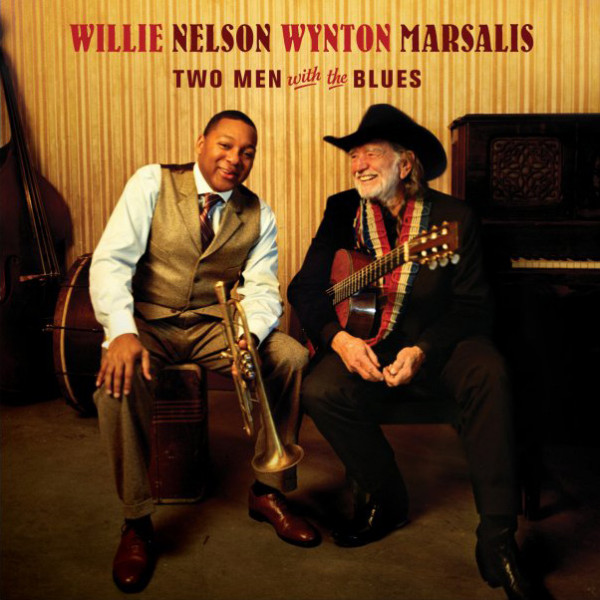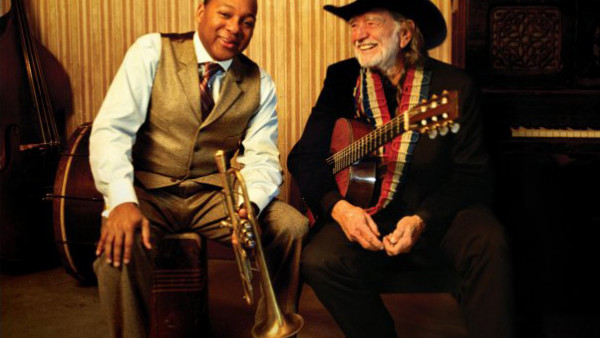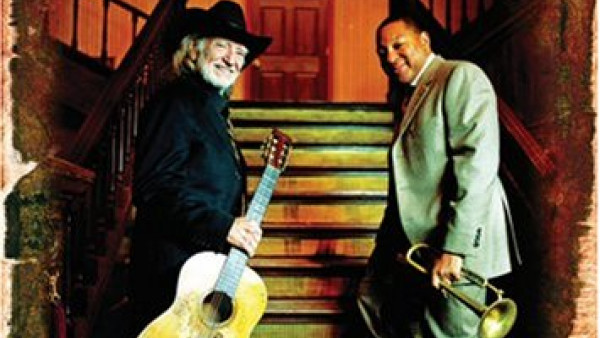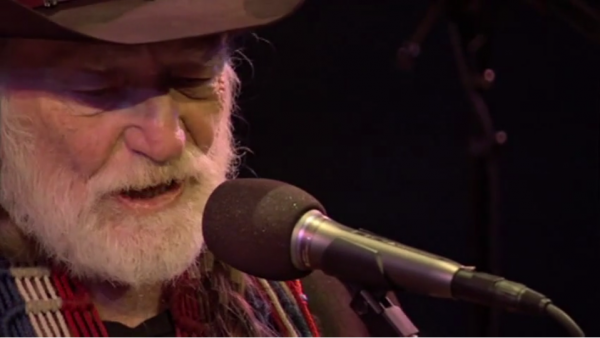NPR interview - Wynton And Willie: Two Men Playing The Blues
On the surface, country music legend Willie Nelson and jazz trumpet icon Wynton Marsalis might seem like an unlikely combination. But when the two came together in January 2007 to perform live at Lincoln Center, they discovered a connection far beyond their admiration for each other’s music. Finding common ground and a mutual love of jazz standards and the blues, they later turned the performances into the newly released album Two Men with the Blues.
All Things Considered host Andrea Seabrook spoke to the two musicians about their first-ever collaboration as the two sat on Nelson’s tour bus before an appearance on The Tonight Show.
Interview Transcription
ANDREA SEABROOK, host:
Now, we think everyone out there is going to know these two names. But just in case, Wynton Marsalis, who is Willie Nelson?
Mr. WYNTON MARSALIS (Musician): American icon, master of all American roots music.
SEABROOK: And, Willie Nelson, who is Wynton Marsalis?
Mr. WILLIE NELSON (Musician): Wynton Marsalis is one of the greatest musicians that I’ve ever run into in my life.
(Soundbite of music)
SEABROOK: So, what do you get when jazz master meets country icon? Well, you get the sound of two men with the blues.
(Soundbite of music)
Mr. NELSON: (Singing) Bright lights, big city, gone to my baby’s head. Bright lights, big city, gone to my baby’s head. Tried to tell the woman but she won’t believe a thing I said.
SEABROOK: This is “Bright Lights, Big City” with Willie Nelson and Wynton Marsalis. A year ago January the two men came together to perform live in Lincoln Center. Call it the G2, a meeting between two heads of state. The sessions were taped and turned into an album of blues and jazz standards called “Two Men with the Blues.” It’s out just this week.
We caught up with them on Willie’s bus parked on Jay Leno’s lot getting ready to go on “The Tonight Show.” Gentlemen, thanks for coming to this show.
Mr. NELSON: Well, you’re welcome.
SEABROOK: Here’s how I’m imagining the two of you right now: Wynton, you’re wearing a suit, looking real sharp, your smooth trumpet is close by in its case. Willie, I imagine you with a red bandana, two braids, humming something heartfelt and lonely. Am I close?
Mr. NELSON: Well, I don’t have the – I got one braid and no bandana and I forgot what I was humming.
(Soundbite of laughter)
Mr. MARSALIS: I have a T-shirt on and some jeans.
SEABROOK: All right. So…
Mr. MARSALIS: And we’re just sitting here on the bus.
(Soundbite of laughter)
SEABROOK: Sitting on a bus having a cup of coffee?
Mr. NELSON: That’s it. Very domestic.
SEABROOK: You know, at first I was surprised to hear that you two had teamed up. It seems unlikely somehow. But is it really that strange?
Mr. MARSALIS: Willie and I were talking yesterday about Jimmy Rodgers and Louis Armstrong recorded “Blue Yodel No. 9.” That was years – that was in the 30s I think. And all American root music is the same. We play shuffle rhythms…
(Soundbite of singing)
Mr. MARSALIS: …we play the blues, we have songs that we know. There was no strain at all for us to play with each other.
Mr. NELSON: Yeah, it’s kind of like getting together more than, you know, coming together for the first time. It’s kind of light getting together again because, you know, we’ve always played basically the same music.
Mr. MARSALIS: Right.
Mr. NELSON: For this gospel, bluegrass, whatever it is.
Mr. MARSALIS: I’m from New Orleans, he’s from Texas, so we’re cousins anyway.
(Soundbite of laughter)
Mr. MARSALIS: It’s like eating barbeque. Texas people barbeque; Louisiana people barbeque catfish. We taught them what to do with a catfish. They were using…
(Soundbite of laughter)
Mr. MARSALIS: …catfish as bait. We don’t have to come together to do that, you know?
(Soundbite of laughter)
Mr. NELSON: Yeah, I would never have to put labels on it because it’s not necessary. It’s only the people who are out there trying to sell it that have to put a label on it to tell somebody what they have. But we don’t really need those labels.
Mr. MARSALIS: That’s right.
SEABROOK: Can you pick a song from your album? Is there a song that illustrates this, what we’re talking about it?
Mr. MARSALIS: “Luck Has Got a Hole In It.”
Mr. NELSON: “Luck Has Got a Hole In It,” and it’s a great example of what I always consider to be, you know, a country song. And then when I found out that Wynton played it better than I did and knew verses that I didn’t know…
(Soundbite of laughter)
Mr. NELSON: …I realized that that song has been over there a while and it just kind of drifted over the Texas line.
(Soundbite of song, “Bucket’s Got a Hole in It”)
Mr. NELSON: (Singing) Well, my bucket’s got a hole in it, my bucket’s got a hole in it, my bucket’s got a hole in it, I can’t buy no (unintelligible). Standing on a corner, got my bucket in my hand, looking for a woman that ain’t got no man. Well, my bucket’s got a hole in it. Well, my bucket’s got a hole in it, my bucket’s got a hole in it, I can’t buy no (unintelligible)…
SEABROOK: There was a great line in the New York Sun this week saying about this song, the reviewer said apparently cowboys and bluesmen can relate equally to this tragic tale of failing to procure any more alcohol.
(Soundbite of laughter)
Mr. NELSON: It sort of bonds us together, you know?
(Soundbite of laughter)
Mr. MARSALIS: That bonds all humanity together.
(Soundbite of laughter)
Mr. MARSALIS: During the prohibition era, the American people sealed their relationship to that.
(Soundbite of laughter)
SEABROOK: So, what happened the first time you two rehearsed together?
(Soundbite of laughter)
Mr. MARSALIS: First, Willie didn’t talk that much. It was one beautiful moment ever heard so we had never played with him. So, the first thing about him is his phrasing. I mean, his phrasing is very unpredictable but it comes out poetic and very logical in a sense of harmony. It’s very advanced; it’s sophisticated. But he’s unassuming so we had one moment in the song where we were playing the ending wrong.
So, Willie turned around – he just looked at the rhythm section. He didn’t say anything. He was just looking, like, it was a pause. So, the rhythm section went back to a certain part in the tune – no words were spoken – and we played it again and it still wasn’t right. And then Willie looked at them and they looked at him, and then we played it again for the third time and it was right. And then when they finished playing, he looked at them and said mighty fine job.
(Soundbite of laughter)
Mr. MARSALIS: That was, like, the basic – it’s not a lot of talking. It’s just basically getting to the music.
Mr. NELSON: Yeah, talking’s not necessary.
SEABROOK: I’ve read about that, Willie Nelson, that people compare your phrasing to a jazz singer because, you know, you’re offbeat a little bit. Can you give us an example of that technique? Can you sing for us?
Mr. NELSON: Well, you know, the song “San Antonio Rose” was written…
(Singing) Within my heart lies…
So I would sing it…
(Singing) Deep within my heart lies a melody, a song of ole San Antone…
We’ll have to record that.
Mr. MARSALIS: Oh, I’d love that. You see he’s keeping the time while he’s singing, right?
(Soundbite of singing)
Mr. MARSALIS: He leaves the space like that and…
Mr. NELSON: Yeah.
Mr. MARSALIS: …it’s beautiful.
SEABROOK: Now that you guys have come together, I want to ask each of you – let me start with you, Wynton Marsalis – is there something you’ve learned from Willie Nelson that you’ll take back?
Mr. MARSALIS: Definitely. I think he’s really has been on the road for so long and he’s contributed so much. If you walk with him on the street and you see the way people love him, his integrity and who he is, he’s so much himself, he’s very relaxed. So I’d say one thing I learned from him in rehearsal – and I’m not even going to talk about musical things; I’m just going to talk about just as a man – you know, the natural order of things between older and younger people and the progression of life and the things you learn.
That’s not suspended because you’re playing music or you’re called country or you’re from Texas or you’re from Louisiana. He’s very relaxed. He doesn’t over-rehearse stuff. When it’s good enough to be played, he stops. He’s fine with it. He says is that cool? Yeah, that’s fine. And also he has an incredible work ethic even at this time. He comes, he doesn’t complain about anything, not a diva. He’s a man. I mean, he’s serious about what he’s doing, he’s professional when he gets to his job.
And he’s somebody to truly be respected for his integrity. He’s a man of deep integrity. So, he strengthened my own integrity, my own understanding of how to relax dealing with other people.
SEABROOK: And I’ll ask you, Willie Nelson, what will you take away from playing with Wynton Marsalis?
Mr. NELSON: Did you ask me a question?
SEABROOK: I did. I said I want to ask you…
Mr. NELSON: I was soaking up what Wynton said.
(Soundbite of laughter)
Mr. NELSON: I said, damn, he’s talking about me.
(Soundbite of laughter)
SEABROOK: I wondered…
Mr. NELSON: So, what was your question, I’m sorry?
SEABROOK: …I wondered if you, Willie Nelson, were taking anything away from playing with Wynton Marsalis?
Mr. NELSON: Oh my goodness, yeah. Every song we play I take something from that. You know, these incredible memories that I’m building up with working with these guys and Wynton and the people that he has around him. I mean, they’re all teachers and you can’t be around them without learning.
SEABROOK: You think you guys ever make a country album?
Mr. NELSON: We just did.
(Soundbite of laughter)
(Soundbite of music)
Mr. NELSON: (Singing) Some people go to school trying to learn how to teach. Some people go to school trying to learn how to preach. But if you can’t preach without going to school, brother, you ain’t no preacher, you’re an educated fool and that’s all.
SEABROOK: Musicians Wynton Marsalis and Willie Nelson. The jazz and country icons spoke to me from Willie’s bus. “Two Men with the Blues.” Thank you both for joining us.
Mr. NELSON: Thank you very much.
Mr. MARSALIS: Thank you very much.
(Soundbite of music)
Mr. NELSON: (Singing) Now, a fellow I know is a nice old man. Trying to save all the money he can. But when that undertaker (unintelligible) where’s he gonna spend that money? Under the ground, that’s all.
Unidentified Man: (Singing) That’s all, that’s all.
Mr. NELSON: (Singing) I said that’s all…
Unidentified Man: (Singing) That’s all, that’s all.
Mr. NELSON: (Singing) You better change your ways over there because the good Lord say that’s all.




